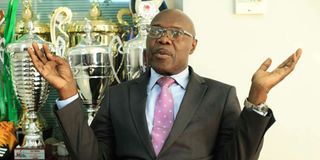Gor aren’t Freemasons but sorcery, it appears, runs in the club’s DNA

Gor Mahia chairman Ambrose Rachier during an interview with Nation Sport at his office in Nairobi on February 12, 2020.
What you need to know:
- On why the founders of Gor Mahia, the club, settled on the name when the team was born in 1968 is a matter of conjecture.
Sometime in May 2019, Gor Mahia’s long-serving chairman Ambrose Rachier surprised fans of the club by announcing that he would be relinquishing his position with club elections due at the end of that year.
At the time, the conveyance lawyer cited, among other reasons, the Sports Act which requires chairmen of clubs and federations not to serve for more than two terms and his desire to hand over leadership to fresh blood.
But the man who Gor Mahia fans affectionately call ‘Ador’ (the acronym of his full name Ambrose Dickson Otieno Rachier) didn’t leave office. He would later explain that some unnamed sponsors had prevailed upon him to stay on. He claimed that the said sponsors had even threatened to terminate a contract with the club should he have left.
Well, Rachier still calls the shots at Gor Mahia and last weekend he made an even bigger announcement with startling revelations of his membership to Freemasonry.
Then all hell broke loose. On a short notice, the club leadership disassociated itself with Rachier’s secretive activities in the dark world of Freemasonry. In the court of public opinion, the club’s infamously boisterous fans were hard-pressed to explain whether they approved of Rachier’s Masonic dealings.
Then word came out that the club leadership was pushing for Rachier’s resignation. Why? Rachier, they said, had tainted the club’s image with his shocking revelation and that the negative publicity he had unwittingly given the club was likely to scare off potential sponsors.
From Rachier’s public admission on national TV, among his professional peers, family members and the K’Ogalo fraternity, the debate degenerated into a question of being or not being Masonic.
Hence, the loud proclamation “We are not freemasons,” by club secretary general Sam Ochola, ditto Senior Counsel and Rarieda MP Otiende Amollo, who together with Rachier run Rachier and Amollo Advocates law firm.
It’s fair enough that nobody wants to be associated with anyone who professes fellowship with the “devilish” male fraternity that Freemasonry is widely perceived to be.
It could even be true that in spite of being led by a Freemason, Gor Mahia is really not Masonic. But what even the dyed-in-the-wool K’Ogalo fans will find extremely hard to dispute is the fact that the club’s origin is steeped in sorcery and black magic.
Here is why. The club, which was formed in 1968 when Luo Union FC and Luo Stars FC merged, is so named after a legendary sorcerer by the same name, who according to Luo mythology could magically transform himself into a child or even a very woman to escape detection whenever he got himself into a sticky situation.
It is also said that he had the ability to cast a similar spell on his enemies.
In Dholuo, the word mahia loosely translates to “wonders” and this sorcerer of yore was so named because of his magical powers.
There is a small booklet called Thuond Luo (Luo Heroes), which documents the heroics of Gor Mahia and other Luo legends. But according to the book, Gor Mahia, the black magician, never really transformed himself, he was merely an illusionist who made people see things that were unreal.
On why the founders of Gor Mahia, the club, settled on the name when the team was born in 1968 is a matter of conjecture. But like the person it’s named after, Gor Mahia is a club of many ‘wonders’, the latest being Rachier’s Masonic bombshell.


